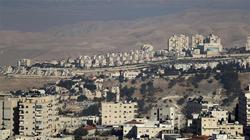 Israeli authorities plan to confiscate thousands of square meters of private Palestinian land in the central West Bank to construct a sewage network for settlements in violation of international law and UN Security Council resolutions condemning the Tel Aviv regime’s land expropriation policies in the occupied territories.
Israeli authorities plan to confiscate thousands of square meters of private Palestinian land in the central West Bank to construct a sewage network for settlements in violation of international law and UN Security Council resolutions condemning the Tel Aviv regime’s land expropriation policies in the occupied territories. RNA - Palestinian sources, requesting not to be named, said authorities in Kifl Haris village in Salfit district were handed on Saturday the blueprint of the sewage network, which is 2,800 kilometers long and has a width of 8 meters and is planned to be built on privately-owned Palestinian land.
The Israeli sewage network will reportedly destroy thousands of square meters of farming land in addition to dozens of olive trees, and will distort the valleys running in the targeted area.
Palestinian activists warn that the villages and towns of Haris, Kifl Haris, Qirah, Dayr Istiya, Bruqin, Kafr al-Dik, Sartah, Bidya and al-Zawiyah will be bulldozed for the construction of the sewage network.
About 600,000 Israelis live in over 230 illegal settlements built since the 1967 Israeli occupation of the Palestinian territories of the West Bank and East Jerusalem al-Quds.
The UN Security Council has condemned Israel’s settlement activities in the occupied territories in several resolutions.
Less than a month before US President Donald Trump took office, the United Nations Security Council in December 2016 adopted Resolution 2334, calling on Israel to “immediately and completely cease all settlement activities in the occupied Palestinian territories, including East Jerusalem” al-Quds.
Palestinians want the West Bank as part of a future independent Palestinian state with East Jerusalem al-Quds as its capital.
The last round of Israeli-Palestinian talks collapsed in 2014. Among the major sticking points in those negotiations was Israel’s continued settlement expansion on Palestinian territories.
Trump backtracked on Washington’s support for a “two-state solution” in 2017, saying he would support any solution favored by both sides.
“Looking at two-state or one-state, I like the one that both parties like. I’m very happy with the one both parties like. I can live with either one,” the US president said during a joint press conference with Israeli Prime Minister Benjamin Netanyahu in Washington on February 15, 2017.
847/940